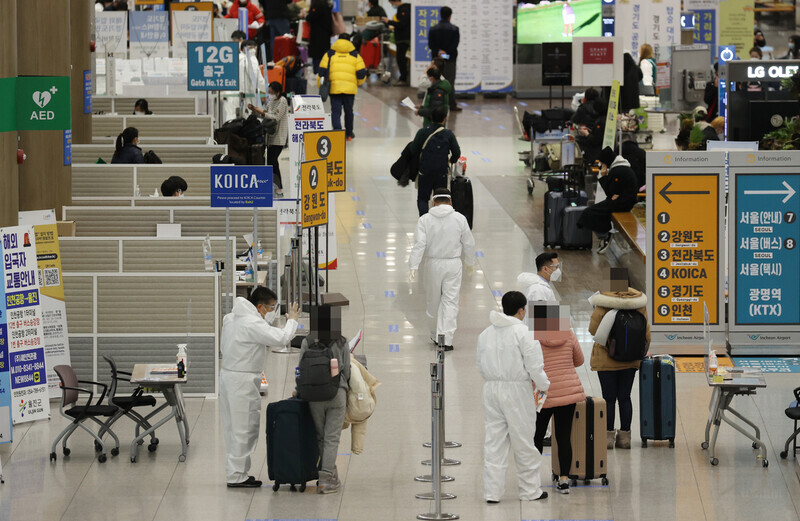hankyoreh
Links to other country sites 다른 나라 사이트 링크
Coronavirus variant may have infected all 38 in S. Korea cluster

Cases of domestic transmission involving a COVID-19 virus variant originating in the UK were confirmed for the first time in South Korea on Feb. 3.
The variant in question is reported to be much more transmissible than the commonly circulating strains in South Korea.
Fears of a resurgence in infections are growing as the daily new confirmed caseload rose above 400 again that day. The government currently plans to observe the situation with the virus this week before making a decision this weekend on whether to relax disease control guidelines.
A total of 467 new COVID-19 patients tested positive by the end of the day on Feb. 2. That number brought the new caseload back over 400 patients after three straight days of totals in the 300-360 range since Jan. 30.
The South Korean government has said it may loosen measures such as restrictions on businesses operating after 9 pm based on the trend in the daily caseload.
In a regular briefing that day, Yoon Tae-ho, head of the disease control team for the Central Disaster Management Headquarters (CDMH), explained, “While transmission associated with International Mission appears to have stopped, cluster infections are appearing in settings associated with everyday activities, and we are also seeing new cluster infections at healthcare institutions and correctional facilities.”
“We do not see this as a situation where we can afford to let our guard down yet,” he stressed.
In particular, disease control authorities have pointed to virus variants as a factor that could drive a resurgence in the current third wave of COVID-19 infections. On Feb. 3, the first cases of virus variants were confirmed in South Korea.
“An analysis of 27 virus samples in South Korea since Feb. 1 showed virus variants in five of them,” the Central Disease Control Headquarters (CDCH) said in a briefing that day.
Of the five samples, four involved a variant originating in the UK, representing the first known cases of local transmission in the community, rather than family members arriving from overseas.
The patients in question were associated with a cluster infection involving relatives of a foreign national in South Gyeongsang Province and South Jeolla Province. A total of 38 people have been diagnosed to date in connection with that cluster.
The index patient, or the first patient diagnosed in the cluster, arrived in South Korea from the United Arab Emirates on Dec. 25 and tested positive on Jan. 7 prior to being released from quarantine.
The patient had been staying at their home in Jinhae, South Gyeongsang. A number of associated cases were subsequently diagnosed, most of them involving immediate family members and relatives.
Infections are believed to have occurred in seven different households through gatherings attended by relatives who had visited the patient’s home. The four patients infected with the UK variant were all relatives of the index patient.
“The contact history has been definitively confirmed in epidemiological terms, so there’s a very good possibility that all 38 of the cases in this [cluster] were infected with the virus variant,” said Park Young-joon, director of the CDCH epidemiological research team.
The fifth case involved a patient in Gumi, North Gyeongsang Province, who was confirmed to have been infected with a virus variant originating in South Africa. This brings the total number of confirmed variant infections in South Korea to 39 since October of last year.
Disease control authorities are watching the virus variants closely, as their higher transmissibility means they could spread more rapidly.
By Seo Hye-mi & Ock Kee-won, staff reporters
Please direct comments or questions to [english@hani.co.kr]

Editorial・opinion
![[Editorial] Intensifying US-China rivalry means Seoul must address uncertainty with Beijing sooner than later [Editorial] Intensifying US-China rivalry means Seoul must address uncertainty with Beijing sooner than later](https://flexible.img.hani.co.kr/flexible/normal/500/300/imgdb/original/2024/0517/8117159322045222.jpg) [Editorial] Intensifying US-China rivalry means Seoul must address uncertainty with Beijing sooner than later
[Editorial] Intensifying US-China rivalry means Seoul must address uncertainty with Beijing sooner than later![[Column] When ‘fairness’ means hate and violence [Column] When ‘fairness’ means hate and violence](https://flexible.img.hani.co.kr/flexible/normal/500/300/imgdb/original/2024/0516/7417158465908824.jpg) [Column] When ‘fairness’ means hate and violence
[Column] When ‘fairness’ means hate and violence- [Editorial] Yoon must stop abusing authority to shield himself from investigation
- [Column] US troop withdrawal from Korea could be the Acheson Line all over
- [Column] How to win back readers who’ve turned to YouTube for news
- [Column] Welcome to the president’s pity party
- [Editorial] Korea must respond firmly to Japan’s attempt to usurp Line
- [Editorial] Transfers of prosecutors investigating Korea’s first lady send chilling message
- [Column] Will Seoul’s ties with Moscow really recover on their own?
- [Column] Samsung’s ‘lost decade’ and Lee Jae-yong’s mismatched chopsticks
Most viewed articles
- 1[Editorial] Transfers of prosecutors investigating Korea’s first lady send chilling message
- 2[Exclusive] Unearthed memo suggests Gwangju Uprising missing may have been cremated
- 3S. Korea “monitoring developments” after report of secret Chinese police station in Seoul
- 4[Editorial] Intensifying US-China rivalry means Seoul must address uncertainty with Beijing sooner t
- 5[Column] US troop withdrawal from Korea could be the Acheson Line all over
- 6China, Russia put foot down on US moves in Asia, ratchet up solidarity with N. Korea
- 7Xi, Putin ‘oppose acts of military intimidation’ against N. Korea by US in joint statement
- 8[Editorial] South Korean women are mobilizing in unprecedented ways
- 9Korea’s first openly trans athlete hopes to prompt a discussion by competing as herself
- 10300 Korean scholars, legal professionals say Yoon is using prosecutors to clamp down on press